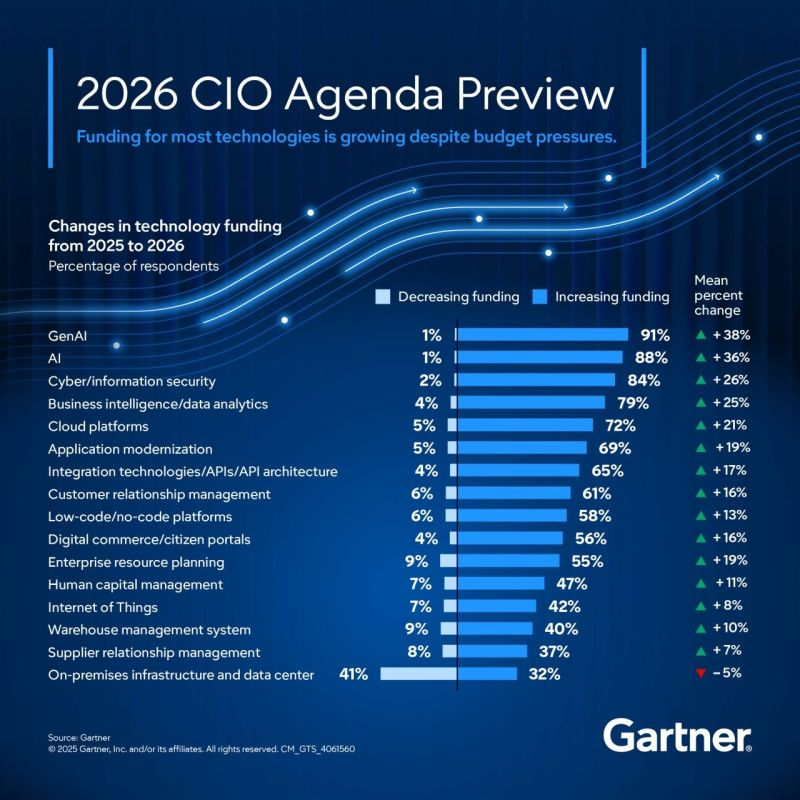Investors Are Asking One Question: Show Me the AI ROI
An AI idea alone isn’t enough to raise millions. See how companies across industries like legal, finance, and robotics built AI business cases that proved AI ROI and won over investors.
As of October 2025, AI startups have attracted nearly $193 billion in funding, accounting for more than half of all venture capital dollars. The signal from investors is unmistakable: show AI ROI or get left behind.
Across industries, companies like Rillet, Eudia, and Figure AI proved that the most fundable AI business cases combine early traction with disciplined execution, turning efficiency gains into lasting strategic value.
The investor mindset in 2025 favors clarity over hype. Startups that demonstrate financial discipline, scalable impact, and operational readiness are defining what a credible AI business case truly looks like.
When Dr Thomas Kelly left the operating room, it was not burnout that pushed him. It was frustration. As a vascular surgery registrar, he spent countless hours documenting, navigating hospital systems, and chasing approvals rather than treating patients. The problem, he realized, was not a shortage of doctors but a shortage of time.
That realization led him to build Heidi Health. Founded in Melbourne in 2019, Heidi was built as an AI resident, a digital partner that takes on the administrative work that pulls clinicians away from care.
From the start, Kelly’s team built the platform with privacy and compliance at its core: patient recordings are encrypted, never stored permanently, and all systems are certified under ISO 27001 and HIPAA standards. Within a few years, the platform was supporting millions of consultations each week across more than 100 countries, and it recently raised $65 million in Series B funding.
This was a huge accomplishment, especially in a market already crowded with competitors like Abridge, Ambience, and Epic. But while others chased hospital integrations and enterprise contracts, Heidi took a different route. Kelly’s team focused on usability, not bureaucracy - building a free AI scribe that any doctor could start using immediately, without waiting for approval or setup.
By proving that solving a real pain point and focusing on usability over complexity drives adoption and measurable AI ROI, Heidi showed investors what a strong AI business case looks like. But what is the ROI of AI, really? It is the measurable return a company gains from AI investments, expressed through increased revenue, reduced costs, higher productivity, or improved customer outcomes.
Heidi Health is part of a much larger trend. As of October 2025, venture investors have poured about $192.7 billion into AI startups, putting 2025 on track to be the first year where more than half of all VC dollars go to AI. That concentration emphasizes that investors are backing provable AI ROI.

In this article, we’ll explore how leading companies that solve real problems with AI technologies like generative AI are proving strong AI ROI and redefining what meaningful innovation looks like.
What Makes an AI Startup Investable in 2025: 3 Data-Driven Lessons
Investors today aren’t backing AI startups for novelty. They’re backing outcomes. The AI startups that win funding are the ones that connect their technology to real results, clear market traction, and the ability to scale.
Here’s how to build an AI business case that investors actually believe in:
- Show Proof, Not Potential: Investors aren’t funding possibilities; they are funding proof. Nearly 70% of executives now expect AI ROI within one to three years, which means startups must deliver measurable outcomes early. The strongest AI business cases demonstrate how technology delivers tangible gains, such as faster processes, lower costs, and a clear financial impact. In today’s AI economy, real results speak louder than potential.
- Turn Early Traction Into Trust: Early traction is powerful, but only when it’s built on trust. In sectors where accuracy and compliance define success, investors look beyond user growth to see whether adoption reflects reliability. The most credible AI startups design for trust from day one, building systems that are accurate, transparent, and aligned with human judgment.
- Execute at Scale with Strategic Readiness: While ambition gets attention, execution earns investment. A company’s AI vision needs to be matched by operational readiness and clear proof that technology can perform at scale. In 2025, China’s tech giants Alibaba, Tencent, and Baidu invested more than $32 billion in AI and digital infrastructure, underscoring that scalable execution is now the ultimate competitive advantage. Investors want to see that innovation is not only possible but also practical, measurable, and built on the right infrastructure and partnerships. The most successful AI startups show they can turn complex technology into real-world reliability, translating ambition into outcomes investors can see, touch, and trust.
Next, we’ll take a closer look at leading companies across industries that have turned strong AI business cases into major AI investment wins using these 3 strategies.
Rillet Shows How Clear ROI Builds a $100M AI Business Case
The demand for AI business cases that deliver real results and AI ROI is spreading across a wide range of industries. For instance, in the finance sector, there’s a need for AI solutions that don’t just automate accounting but deliver visible ROI across the organization.
That’s where Rillet found its opportunity. Founded by Nicolas Kopp, former U.S. CEO of N26, the company began with a simple frustration: finance teams were still waiting weeks for data because their accounting systems hadn’t kept pace with how businesses actually run. Rillet set out to change that by reimagining enterprise accounting with an AI platform that could think, move, and respond as quickly as the teams using it.
From day one, Rillet focused on showing proof, not potential. Its AI-native ERP platform, built by accountants for accountants, helped companies close their books in 3 days instead of weeks, cut the finance team by up to 70 percent, and complete new system rollouts in just 4 weeks, rather than the year-long cycles typical of legacy tools.
Within its first year, Rillet signed more than 200 customers, doubled recurring revenue in just 12 weeks, and partnered with top accounting firms such as Armanino and Wiss. Each milestone reflected a simple truth: real AI ROI comes from solving real problems.
Ultimately, that evidence spoke louder than any pitch. In 2025, Rillet raised $70 million in Series B funding co-led by Andreessen Horowitz and ICONIQ, bringing its total to $100 million in less than a year, with backing from Sequoia and Oak HC/FT. For investors, it was proof that real-world outcomes still matter most. By proving AI ROI with clear results, Rillet reminded investors that trust is built on outcomes, not promises.
A Legal Startup with Early Traction: Eudia’s $105M Case for Efficiency
Similarly, in the quiet corridors of corporate law departments, a problem was hiding in plain sight. Brilliant lawyers were spending their days buried in compliance reviews and risk documentation instead of shaping business strategy.
For Omar Haroun, who had spent years helping Fortune 500 companies adopt AI, it became clear that technology had not yet delivered on its promise to make legal work smarter. The existing legal tools were fast, but not trusted. Accurate in theory, but unreliable in context.
After selling his first AI company, Omar decided to start again - this time with a mission to create intelligence that worked with humans, not around them. That vision and AI business use case became Eudia, a Legal AI platform named after “eudaimonia,” the Greek idea of human flourishing.
Eudia spent 18 months in stealth, working side by side with Fortune 500 legal teams to co-design a system that understood the complexity of real-world legal work. The result was an Augmented Intelligence platform that helped in-house lawyers automate compliance and manage risk without compromising accuracy or control.
“Over the past 18 months, we’ve experienced incredible growth. The traction we’ve seen with Fortune 500 legal departments has been unprecedented.”
- Omar Haroun, Co-founder and CEO, Eudia
That early traction built investor confidence and set the stage for enterprise-scale results. For global enterprises like Cargill, DHL, Duracell, and Coherent, Eudia delivered measurable AI ROI, up to 98% efficiency gains in compliance reviews, and turned legal operations from cost centers into strategic assets.
When Eudia emerged publicly in early 2025, it was not another startup chasing hype but proof that trust, performance, and scale could coexist. The company secured $105 million in Series A funding led by General Catalyst, one of the largest AI investments of the year. Eudia proved that early traction and real AI ROI speak louder to investors than any promise of innovation.
What It Takes to Build a $1B AI Business Case in Robotics
So far, we’ve seen how AI software companies like Rillet and Eudia turned automation into measurable business outcomes, AI ROI, and early traction that investors could trust. But in robotics, the stakes are higher. Unlike software, which can scale with code and compute, building intelligent machines means proving reliability in the real world. It is one thing to promise automation. It is another to make a robot think, move, and act safely alongside people.
That challenge is exactly where Brett Adcock saw an opportunity. When he founded Figure AI, his goal was ambitious yet grounded: to create humanoid robots that could work in factories, warehouses, and offices with human-like adaptability. Instead of chasing hype, Adcock focused on disciplined execution.

His team built tangible proof points that investors could see, touch, and measure. Collaborations with OpenAI gave the robots reasoning and language understanding, while a partnership with Microsoft Azure provided the scale and infrastructure to train and deploy at speed. Together, these moves showed not just vision but readiness and clarity.
The results spoke for themselves. In 2025, Figure AI raised more than $1 billion in Series C funding from Parkway Venture Capital, Nvidia, Intel, LG, Salesforce, and Qualcomm. Its roadmap to deliver 100,000 humanoid robots within four years no longer seemed like science fiction. For investors, it was a clear example of how execution powered by people, partnerships, and platforms can transform innovative ideas into measurable AI ROI and lasting enterprise value.
The New Rule of AI Investment: Show Value, Win Trust
Earlier, we mentioned that Heidi Health raised $65 million in its Series B funding round. But a fascinating insight is that this milestone came just seven months after its $16.6 million Series A round, showing how quickly investors respond when a startup proves real value and AI ROI.
This reflects a broader trend. The startups that win funding are the ones that connect vision to validation, demonstrate real impact early, and execute with clarity. In the new AI economy, innovation alone is not enough. It is the ability to deliver measurable business value that turns ambition into enduring investor confidence.





.svg)






_0000_Layer-2.png)

